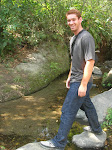 tisans would fit with Mercado’s model. Mercado was created by Ruth Degolia, who founded the organization from her thesis at Yale University. I spoke with Mercado last week, and they informed me that given my strong background in business that they have another program they would like me to work on. They asked me if I would be interested in setting up a micro bank in Panajachel, Guatemala (see picture below) for their network of cooperatives. I told them that it would be a privilege, and a dream-come-true. Although I have been reading about microfinance for some time now, after this phone call I began to research microfinance in a new form. Studying the models of Dr. Yunus’ Grameen Bank, among other successful MFI’s (micro-finance institutions) such as Namaste, Accion and Opportunity International, my thought is to take that which I like from each, and form my own model; a model that works for the people of Panajachel. Recently I have received many questions as how I am going to create this bank. In my next post I will give these details!
tisans would fit with Mercado’s model. Mercado was created by Ruth Degolia, who founded the organization from her thesis at Yale University. I spoke with Mercado last week, and they informed me that given my strong background in business that they have another program they would like me to work on. They asked me if I would be interested in setting up a micro bank in Panajachel, Guatemala (see picture below) for their network of cooperatives. I told them that it would be a privilege, and a dream-come-true. Although I have been reading about microfinance for some time now, after this phone call I began to research microfinance in a new form. Studying the models of Dr. Yunus’ Grameen Bank, among other successful MFI’s (micro-finance institutions) such as Namaste, Accion and Opportunity International, my thought is to take that which I like from each, and form my own model; a model that works for the people of Panajachel. Recently I have received many questions as how I am going to create this bank. In my next post I will give these details! I have a strong passion for micro-finance. Microfinance is the supply of loans, savings, and other basic financial services to the poor. I have seen how microcredit is a proven poverty reduction tool, providing the necessary capital for individuals at the BOP to become entrepreneurs, think innovatively, and create wealth for themselves. I now have a sense of belief for providing aid from the bottom up, and not as much focusing on dumping money from the top down. With this tool we may provide that step-stool that will allow these nations to reach the bottom of the ladder, and hopefully begin to climb up the rungs on their own. Another way of looking, microfinance is not providing hand-outs, but providing a hand-up.
I have a strong passion for micro-finance. Microfinance is the supply of loans, savings, and other basic financial services to the poor. I have seen how microcredit is a proven poverty reduction tool, providing the necessary capital for individuals at the BOP to become entrepreneurs, think innovatively, and create wealth for themselves. I now have a sense of belief for providing aid from the bottom up, and not as much focusing on dumping money from the top down. With this tool we may provide that step-stool that will allow these nations to reach the bottom of the ladder, and hopefully begin to climb up the rungs on their own. Another way of looking, microfinance is not providing hand-outs, but providing a hand-up.Access to credit allows poor people to take advantage of economic opportunities. While increased earnings are by no means automatic, clients have overwhelmingly demonstrated that reliable sources of credit provide a fundamental basis for planning and expanding business activities.
By reducing vulnerability and increasing earnings and savings, financial services allow poor households to make the transformation from "every-day survival" to "planning for the future." Households are able to send more children to school for longer periods and to make greater investments in their children's education. Increased earnings from financial services lead to better nutrition and better living conditions, which translates into a lower incidence of illness. Increased earnings also mean that clients may seek out and pay for health care services when needed, rather than go without or wait until their health seriously deteriorates.


No comments:
Post a Comment